การศึกษาองค์ประกอบรูปแบบการบริหารองค์กรตามแนวปรัชญาเศรษฐกิจพอเพียงสำหรับอุตสาหกรรมการผลิต : กรณีศึกษาผู้ได้รับรางวัลการประกวดผลงานตามปรัชญาเศรษฐกิจพอเพียง
Main Article Content
Abstract
บทคัดย่อ
งานวิจัยนี้มีเพื่อศึกษาองค์ประกอบรูปแบบองค์กรตามแนวปรัชญาเศรษฐกิจพอเพียงสำหรับอุตสาหกรรมการผลิตขนาดย่อม ใช้การสัมภาษณ์โดยแบบสัมภาษณ์กึ่งโครงร่างเพื่อหาองค์ประกอบองค์กรตามแนวปรัชญาเศรษฐกิจพอเพียง กับผู้ได้รับรางวัลการประกวดผลงานตามปรัชญาเศรษฐกิจพอเพียง 5 ท่าน จัดโดยสำนักงานคณะกรรมการพิเศษเพื่อประสานงานโครงการอันเนื่องมาจากพระราชดำริ และทำการวิเคราะห์ข้อมูลโดยวิธีการวิเคราะห์แก่นสาระ
ผลการศึกษาทำให้พบรูปแบบการบริหารธุรกิจตามแนวปรัชญาเศรษฐกิจพอเพียงสำหรับอุตสาหกรรมการผลิตขนาดย่อม โดยแบ่งออกเป็น 4 ส่วน คือ มุมมองด้านการเรียนรู้และการเจริญเติบโต มุมมองด้านกระบวนการภายใน มุมมองด้านลูกค้าและมุมมองการเงิน การปฏิบัติตามรูปแบบที่นำเสนอจะทำให้เกิดความยั่งยืน ด้วยองค์กรผู้ให้ข้อมูลทั้ง 5 ราย ปฏิบัติจริงมีความมั่นคงยั่งยืน มีผลประกอบการที่ดีและผ่านวิกฤตเศรษฐกิจมาได้
ABSTRACT
The purpose of this research was to study the configuration of the sufficiency economy model for small industries. A semi-structured interview was employed in this research in order to extract the configuration of the sufficiency economy model from five small industries whose their entrepreneurs won the first and the second Sufficiency Economy Fellowship Contest initiated by the Office of the Royal Development Project Board. The Thematic Analysis method was employed for the data analysis.
The configuration of the Sufficiency Economy-based business model for small industries was found in this research. The model was divided by the Balanced Scorecard into five perspectives a learning and growing perspective, an internal process perspective, a customer perspective, and a financial perspective. To follow the proposed model maintains the sustainability since these five entrepreneurs can make corporate sustained, profitable business and overcome the economic crisis.Article Details

This work is licensed under a Creative Commons Attribution-NonCommercial-NoDerivatives 4.0 International License.
บทความทุกเรื่องได้รับการตรวจความถูกต้องทางวิชาการโดยผู้ทรงคุณวุฒิ ทรรศนะและข้อคิดเห็นในบทความ Journal of Global of Perspectives in Humanities and Social Sciences (J-GPHSS) มิใช่เป็นทรรศนะและความคิดของผู้จัดทำจึงมิใช่ความรับผิดชอบของบัณฑิตวิทยาลัย มหาวิทยาลัยราชภัฏวไลยอลงกรณ์ ในพระบรมราชูปถัมภ์ กองบรรณาธิการไม่สงวนสิทธิ์การคัดลอก แต่ให้อ้างอิงแหล่งที่มา


